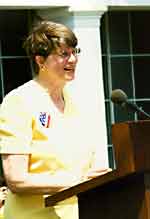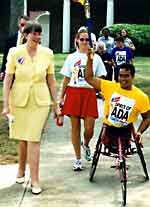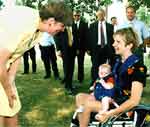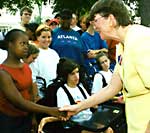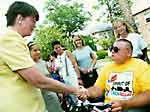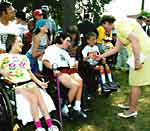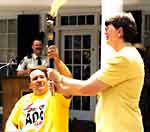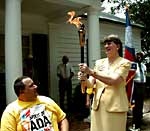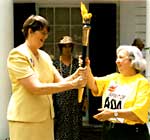Remarks of Attorney General Janet Reno
Spirit of ADA Torch Relay Celebration
Georgia Hall Quadrangle
Roosevelt Warm Springs Institute
for Rehabilitation
Warm Springs, Georgia
Wednesday,
July 19, 2000
3:00 p.m.
Attorney General Janet Reno
at the Roosevelt Warm Springs Institute in Warm Springs, GA
Attorney General Janet Reno
at the Little White House in Warm Springs, GA (below)
ATTORNEY GENERAL RENO: Thank you, Senator Lee, and thank you all for making me feel so welcome. My mother was from Macon, Georgia and I feel like I have come home.
I have come home to a state who sent to Washington a wonderful public servant -- Paul Coverdell reminded us all of the importance of public service and he accomplished that public service with a courtliness, a gallantry that was refreshing and wonderful. He treated everyone with such respect, regardless of whether they disagreed, and he represents to me what a public servant should be about in civility and grace. He will be sorely missed.
The subject of people coming together to recognize that in every single person there is a spirit, a strength, a determination and a capacity somehow to achieve and to do, if they are given only half a chance, is one of the things that I think carries me on. I look at people do some terrible things and then I think how can we change this, how can we make a difference. And I see the spirit that's here today, I see the spirit of those with disabilities, and I say yes, we can make a difference. And the way you have come together today -- Mr. Mendoza, Mr. McNeilly, walking with me and rolling with me with the torch -- was something that I'm not going to forget. The spirit that's through this crowd as I came in is almost contagious, you can almost feel it. That is what we should be about, coming together as a community, to find the best in everyone and to give everyone equal opportunity.
(Applause.)
ATTORNEY GENERAL RENO: I remember the day Franklin Roosevelt died. We were waiting for my daddy at the bus depot and people began to weep -- Republicans and Democrats. He was very special, and to come here to see the room he sat in, to see the places he went, has meant so much to me, because that man represented again a person who believed in people -- not just some people, but all people of the United States.
(Applause.)
ATTORNEY GENERAL RENO: He believed we could overcome a depression, he believed we could overcome two wars fought halfway around the world from each other at the same time, he believed in the courage, the strength and the magnificence of the American people, and indeed all people. And he believed in himself, he believed that he did not have to go home to Hyde Park and stay there, as so many people had for so long. He believed he could go out and be President of the United States. And just think about it -- we can go serve our country, we can support our family, we can be the best business person going, we can be the most wonderful artist, we can be the county commissioner, with the spirit that is here today.
It has been so exciting to see what has happened. The ADA is a wonderful law, it's a simple law -- and if anybody gives you any trouble and tells you that it's complicated, terrifying or has too much regulation in it, tell them to call me at 514-2002.
(Applause.)
ATTORNEY GENERAL RENO: Because of the tireless work of everyone here and people all across the country, both those with disabilities and those who care, doors are being opened. I have traveled this country and in the seven and a half years I have been in office, I have seen people gain access to the courthouse that they never had before. I have seen people gain access to the drugstore that they never had before. I've seen and heard a shrewd young man describe how he told the druggist, "you want my business, then widen the aisles."
We have seen what the spirit here today can do when people come together and care. Indeed, all the opportunities this nation has to offer are becoming more accessible each day. What do we have to do? You've got to work harder, I've got to work harder. Somebody just asked me, "Are you satisfied with the Justice Department's response to date?" For as long as there is anyone with a disability that doesn't have access to something they want access to, I want to make sure that we continue to try harder.
(Applause.)
ATTORNEY GENERAL RENO: The U.S. Supreme Court heard the voices of two Georgians -- Lois Curtis and Elaine Wilson both have developmental disabilities and psychiatric disabilities, both were institutionalized even though they could have lived in the community with the right support services. We were proud to join their struggle and to appear in the United States Supreme Court to support them, and we were delighted last year when the United States Supreme Court declared that unjustified segregation of people with disabilities in institutions violates the ADA. We can use this as an example for others as well. This landmark ruling is bringing hope of greater freedom and dignity to millions of people with disabilities and their families and friends across this country.
And think, as Americans' life expectancy increases, we can give hope to so many people, keep them out of nursing homes, keep them in their community, keep them so that they can be strong and thrive and contribute. Have you ever seen an 85-year-old person teach her grandson how to use the computer? It's usually the reverse, but it's happening today.
One of the basic freedoms of every American is to have access to the institutions of government. Too often, you can't go to the county commission because you can't hear what's going on; you can't get in the courthouse; you can't get to the courtroom. Last fall, we began Project Civic Access. Our goal is to make sure that the ADA's promise of equal access to civic life is fulfilled. We sent investigators to a city or town in each of the 50 states. We found in many places that some changes had been made to provide access, but in many, they were not comprehensive enough to ensure the accessibility of town programs. But we found a willingness to get on with the job of reaching ADA compliance -- they just needed to know how, in some instances.
As a result of this initiative, today I'm pleased to announce that we are signing 10 agreements and we're in the process of negotiating 15 others. These agreements are comprehensive, they address the entire range of ADA issues such as accessibility of town halls, parks and polling places and effective communication in city hall, meetings, court proceedings and other government activities. They are models for towns and cities across the country to follow in complying with the ADA.
We also created two user-friendly guides to help in this effort and we have distributed them far and wide.
I don't want to do it just a case at a time, I want to see America open its doors for all our people.
(Applause.)
ATTORNEY GENERAL RENO: Unfortunately, some people say that the ADA's requirements for state and local government are unconstitutional. We think there is nothing unconstitutional about a law ensuring the equal right of all Americans to access to their government. We have fought this battle in over 40 courts nationwide, winning in almost every case, and we will proudly defend the ADA this October before the United States Supreme Court.
(Applause.)
ATTORNEY GENERAL RENO: But there is more to do and we have a long way to go, and we know it. President Clinton has asked Congress for a 35 percent increase for Justice Department ADA enforcement. These new funds are critical for the vigorous and comprehensive effort that we want to undertake.
This past Saturday, I stood at Runnymeade in England, where King John met the Barons and the Magna Carta was signed. It put people first. In those days, it was just the Barons. Let us go forth from this place today and put all the people of America first. Let us understand the strength of the human spirit and let us, as we watch the torch being carried in today, carry that spirit throughout America and around the world until every single door is open.
God bless you all.
(Applause.)
last updated July 28, 2000
